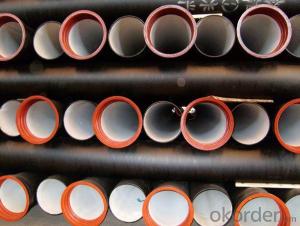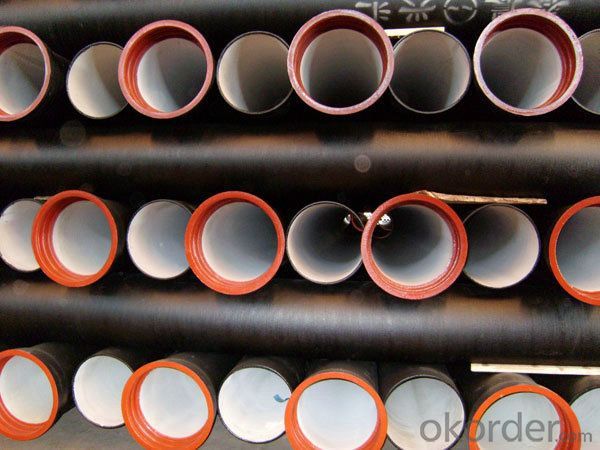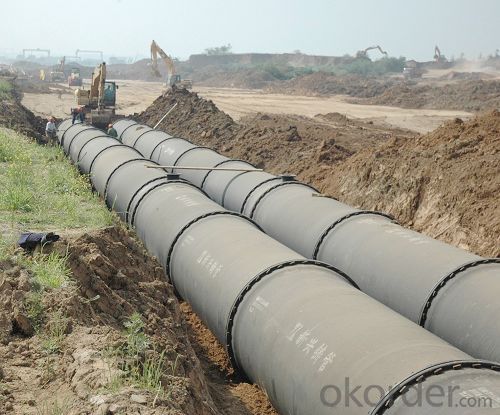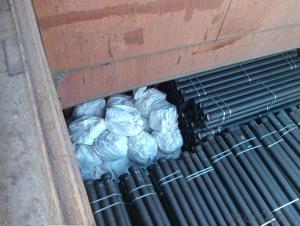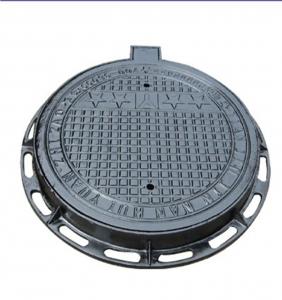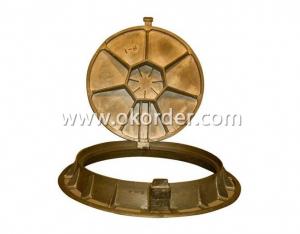Ductile Iron Self Restrained Pipe of China DN300 for Water Supply
- Loading Port:
- China main port
- Payment Terms:
- TT or LC
- Min Order Qty:
- 20 m.t.
- Supply Capability:
- 100000 m.t./month
OKorder Service Pledge
OKorder Financial Service
You Might Also Like
1,Ductile Iron Self Restrained Pipe Description :
The ductile iron self restrained pipe manufactured by SYI foundry are mainly used for conveying many fluid media such as water, oil and gas, are widely used in various pipeline projects for metallurgy, mine, water conservancy, petroleum and urban public service utility. Self-restrained joint adopts the T type joint sealing structure. Compared with T-type joint, adds a welded bead on spigot, and open-end locking ring, a gland and connecting bolts to provide the joint with good anti-slippage performance. The locking ring and the gland can slide between each other, so that the joint had certain axial stretching and deflection capability.
2,Main Features of the Ductile Iron Self Restrained Pipe:
The diameter is from DN 80 to DN 2000(Tyton, Class K7/9/14) under standard ISO2531 4179 8179 EN545, normally work length is 6 meters, Tyton socket-spigot, K9.
The ductile cast iron pipe, cast pipe & cast iron pipe manufactured by SYI is mainly used for conveying fluid media.
3,Ductile Iron Self Restrained Pipe Images:
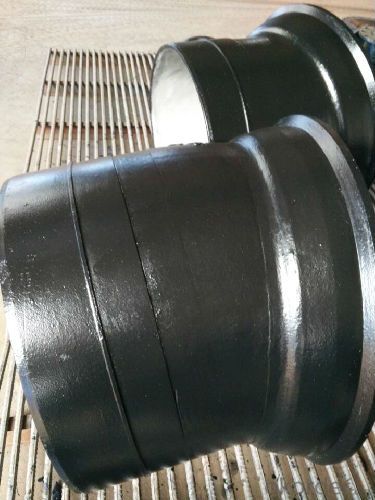
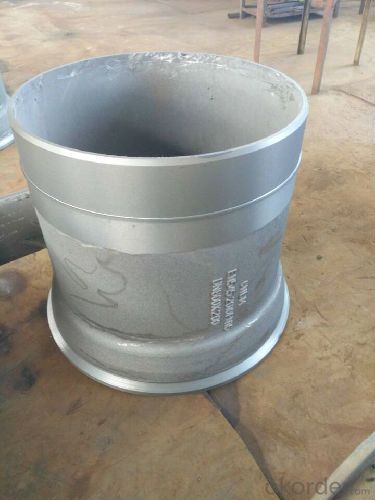
4. Ductile Iron Self Restrained Pipe Specification
1. Material: Ductile iron grade 500-7/ 450-10 in accordance with ISO1083
2. Standard: ISO 2531, EN545, EN598, ANSI, AWWA
3. Certificate: ISO9001, ISO14001, SGS, NSF, WRAS
4. Test: In accordance with ISO 2531 / EN 545 / EN598 and 100% water pressure test
5. Length: 6m or cut into 5.6m, 5.7m, 5.8m
6. Internal Lining: Cement, conform to ISO4179
7. External coating: Zinc + Bitumen, conform to ISO8179
8. Rubber: NBR, SBR, EPDM according to ISO4633 / EN681.1
9. Note: The gaskets, bolts & nuts are supplied respectively as your special requirement
5.FAQ:
We have organized several common questions for our clients,may help you sincerely:
1.Q: Why would you choose ductile iron pipe rather than other pipe materials?
A:The reasons are obvious for that not only ductile iron pipe possesses the inherent strength and flexibility of ductile iron, combined with proven corrosion protection systems, but also the cost savings can be achieved from design to installation and commissioning.
2.Q:Why can you guarantee the inner of pipes can’t be corroded?
A: High alumina cement mortar lining and sulphate-resistant cement mortar lining. These two special linings are applicable to inner anti-corrosion for sewage pipes, improving resistance to erosion of the sewage components.
- Q:Can ductile iron pipe be used for underground applications?
- Indeed, underground applications can employ ductile iron pipe. Renowned for its robustness and endurance, ductile iron pipe proves to be well-suited for a multitude of underground uses, including water and sewage systems, gas pipelines, and irrigation systems. Its exceptional resistance to corrosion and external burdens renders it a dependable selection for underground installations, where sustained functionality and structural soundness are pivotal considerations. Moreover, ductile iron pipe's pliability enables it to endure ground shifting and settling sans fracturing or shattering, making it an apt choice for regions susceptible to seismic occurrences.
- Q:What is the expected pressure class for ductile iron pipes?
- The pressure class anticipated for ductile iron pipes may differ based on the particular use and project needs. In a general sense, ductile iron pipes are engineered to manage high-pressure situations and are typically offered in pressure classes spanning from 150 psi to 350 psi. These pressure classes signify the utmost operational pressure that the pipe can endure while preserving its structural soundness. To ascertain the suitable pressure class for ductile iron pipes in a specific scenario, it is crucial to refer to industry standards, guidelines, and project specifications.
- Q:How do ductile iron pipes perform in earthquake-induced ground movements?
- Ductile iron pipes have proven to be a reliable and resilient choice for underground infrastructure, including in areas prone to earthquake-induced ground movements. The unique properties of ductile iron, such as its strength and flexibility, allow it to withstand the effects of ground movements during an earthquake. During an earthquake, the ground experiences shaking and shifting, which can exert significant forces on underground pipes. Ductile iron pipes have the ability to flex under these forces, absorbing the energy and reducing the risk of failure. They can withstand substantial ground movements without cracking or breaking, which ensures the continued flow of water or other fluids. In addition, ductile iron pipes have excellent resistance to corrosion and are highly durable, making them suitable for long-term use in earthquake-prone areas. This reduces the need for frequent maintenance or replacement, providing cost-effective and reliable infrastructure solutions. Furthermore, the joints used in ductile iron pipe installations are designed to accommodate movement and allow for slight adjustments during ground shifts. This flexibility prevents the pipes from becoming dislodged or separated, maintaining the integrity of the system. Overall, ductile iron pipes have a proven track record of performance in earthquake-induced ground movements. They offer resilience, flexibility, and durability, ensuring the continuous functioning of water and sewer systems even in areas prone to seismic activity.
- Q:What is the minimum pipe diameter of cast iron pipe?
- Nominal diameter of continuous grey cast iron pipe is 75~1200 mm, minimum 75 mm, maximum 1200 mm.
- Q:Can ductile iron pipes be used for slurry transportation?
- Yes, ductile iron pipes can be used for slurry transportation. Ductile iron pipes are known for their high strength and durability, making them suitable for various applications including slurry transportation. Slurry is a mixture of solid particles and a liquid, which can be abrasive and corrosive. Ductile iron pipes have excellent resistance to abrasion, corrosion, and erosion, making them capable of handling the challenges posed by slurry transportation. Additionally, ductile iron pipes offer a smooth inner surface, reducing friction and improving the flow of slurry. Therefore, ductile iron pipes are a reliable choice for slurry transportation systems in industries such as mining, wastewater treatment, and oil and gas.
- Q:What is the maximum temperature that ductile iron pipes can handle?
- The ability of ductile iron pipes to withstand high temperatures is influenced by factors like the grade of ductile iron, the application, and the duration of exposure to heat. Typically, ductile iron pipes are advised to be used within a temperature range of approximately 400-450 degrees Fahrenheit (205-232 degrees Celsius). However, it is essential to refer to the manufacturer's instructions and specifications for the particular product, as temperature limits may vary slightly among grades and manufacturers. Additionally, it is vital to take into account the thermal expansion and contraction properties of ductile iron pipes to prevent any possible problems in environments with elevated temperatures.
- Q:How does ductile iron pipe perform in high-temperature steam applications?
- Ductile iron pipe performs quite well in high-temperature steam applications. Ductile iron is a strong and durable material, known for its ability to withstand high pressures and temperatures. When exposed to high-temperature steam, ductile iron pipes maintain their structural integrity and do not deform or crack easily. They have a high resistance to thermal expansion and contraction, making them suitable for applications where temperature variations are common. Additionally, ductile iron pipes have excellent corrosion resistance, which is especially important in steam applications where the presence of moisture can lead to accelerated corrosion. Overall, ductile iron pipes are a reliable choice for high-temperature steam applications, providing long-lasting performance and ensuring the safe and efficient transportation of steam.
- Q:Can ductile iron pipes be used for gas distribution systems?
- Yes, ductile iron pipes can be used for gas distribution systems. Ductile iron pipes have been widely used in various infrastructure applications, including gas distribution systems, due to their strength, durability, and corrosion resistance. These pipes are designed to withstand high-pressure gas flow and are suitable for both underground and above-ground installations. Additionally, ductile iron pipes have excellent resistance to external loads and are less prone to damage or breakage, making them a reliable and safe choice for gas distribution systems. However, it is important to ensure that the pipes are properly coated and protected against any potential corrosive elements present in the gas or soil to maintain their longevity and performance.
- Q:Can ductile iron pipes be used in areas with high soil salinity?
- Indeed, areas with high soil salinity can accommodate the use of ductile iron pipes. These pipes possess notable resistance to corrosion, rendering them compatible with different soil conditions, even those with elevated salinity levels. Usually, these pipes are coated with a safeguarding layer, such as polyethylene or zinc, which bolsters their capacity to ward off corrosion caused by saltwater or saline soils. Furthermore, employing appropriate installation methods, such as meticulous backfilling and soil compaction around the pipes, can effectively mitigate the potential consequences of high soil salinity on the durability and effectiveness of ductile iron pipes.
- Q:Can ductile iron pipe be used for water treatment plant applications?
- Yes, ductile iron pipe can be used for water treatment plant applications. Ductile iron pipe is known for its strength and durability, making it suitable for transporting water and other fluids in various industrial settings, including water treatment plants. Its corrosion resistance and ability to withstand high pressure and temperature make it an ideal choice for applications where the pipe is exposed to chemicals, disinfectants, and other treatment processes. Additionally, ductile iron pipe is easy to install, maintain, and repair, making it a cost-effective option for water treatment plant infrastructure.
1. Manufacturer Overview |
|
|---|---|
| Location | |
| Year Established | |
| Annual Output Value | |
| Main Markets | |
| Company Certifications | |
2. Manufacturer Certificates |
|
|---|---|
| a) Certification Name | |
| Range | |
| Reference | |
| Validity Period | |
3. Manufacturer Capability |
|
|---|---|
| a)Trade Capacity | |
| Nearest Port | |
| Export Percentage | |
| No.of Employees in Trade Department | |
| Language Spoken: | |
| b)Factory Information | |
| Factory Size: | |
| No. of Production Lines | |
| Contract Manufacturing | |
| Product Price Range | |
Send your message to us
Ductile Iron Self Restrained Pipe of China DN300 for Water Supply
- Loading Port:
- China main port
- Payment Terms:
- TT or LC
- Min Order Qty:
- 20 m.t.
- Supply Capability:
- 100000 m.t./month
OKorder Service Pledge
OKorder Financial Service
Similar products
New products
Hot products
Hot Searches
Related keywords
